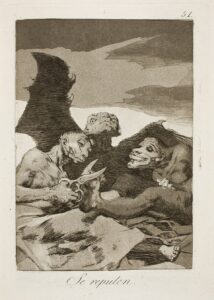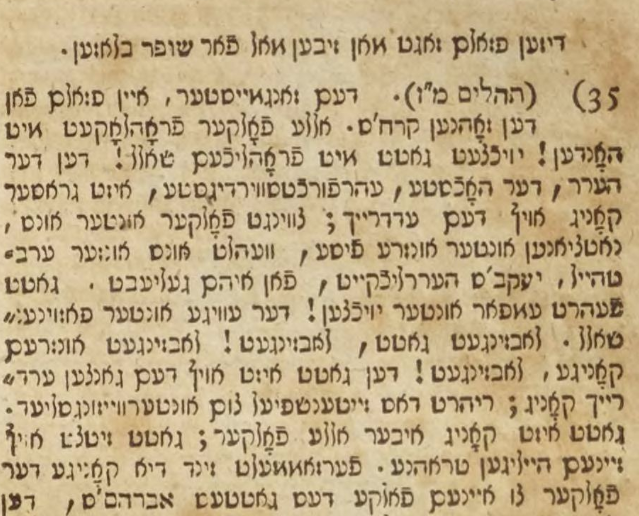| Source (Hebrew) | Translation (English) |
|---|---|
לַמְנַצֵּ֥חַ בִּנְגִינֹ֗ת מַשְׂכִּ֥יל לְדָוִֽד׃ |
To the conductor, arioso, a lesson of David. |
הַאֲזִ֣ינָה אֱ֭לֹהִים תְּפִלָּתִ֑י וְאַל־תִּ֝תְעַלַּ֗ם מִתְּחִנָּתִֽי׃ הַקְשִׁ֣יבָה לִּ֣י וַעֲנֵ֑נִי אָרִ֖יד בְּשִׂיחִ֣י וְאָהִֽימָה׃ מִקּ֤וֹל אוֹיֵ֗ב מִ֭פְּנֵי עָקַ֣ת רָשָׁ֑ע כִּֽי־יָמִ֥יטוּ עָלַ֥י אָ֗֝וֶן וּבְאַ֥ף יִשְׂטְמֽוּנִי׃ |
Listen, God, to my prayer; and do not hide from my plea. Hearken to me and answer me, I am restless in my murmering and moaning at the enemy’s sound, from the wicked’s oppression, for they drop evil upon me, in rage oppose me. |
לִ֭בִּי יָחִ֣יל בְּקִרְבִּ֑י וְאֵימ֥וֹת מָ֗֝וֶת נָפְל֥וּ עָלָֽי׃ יִרְאָ֣ה וָ֭רַעַד יָ֣בֹא בִ֑י וַ֝תְּכַסֵּ֗נִי פַּלָּצֽוּת׃ |
My heart trembles inside me, and death’s terrors fall upon me. Fear and trembling come upon me, I am covered in horror. |
וָאֹמַ֗ר מִֽי־יִתֶּן־לִ֣י אֵ֭בֶר כַּיּוֹנָ֗ה אָע֥וּפָה וְאֶשְׁכֹּֽנָה׃ הִ֭נֵּה אַרְחִ֣יק נְדֹ֑ד אָלִ֖ין בַּמִּדְבָּ֣ר סֶֽלָה׃ אָחִ֣ישָׁה מִפְלָ֣ט לִ֑י מֵר֖וּחַ סֹעָ֣ה מִסָּֽעַר׃ |
And I said, “Who would give me wings like a dove, so I could fly off and shelter!? Surely I would flee far, I would dwell in the wilds — selah — I would hurry to a refuge for me, from the sweeping storming wind.” |
בַּלַּ֣ע אֲ֭דֹנָי פַּלַּ֣ג לְשׁוֹנָ֑ם כִּֽי־רָאִ֨יתִי חָמָ֖ס וְרִ֣יב בָּעִֽיר׃ יוֹמָ֤ם וָלַ֗יְלָה יְסוֹבְﬞבֻ֥הָ עַל־חוֹמֹתֶ֑יהָ וְאָ֖וֶן וְעָמָ֣ל בְּקִרְבָּֽהּ׃ הַוּ֥וֹת בְּקִרְבָּ֑הּ וְֽלֹא־יָמִ֥ישׁ מֵ֝רְחֹבָ֗הּ תֹּ֣ךְ וּמִרְמָֽה׃ |
Swallow up, divide their speech, Cause; for I see violence and strife in the city! Day and night they surround its walls, evil and toil are within it. Ruin is within it, fraud and deceit never leave its plaza. |
כִּ֤י לֹֽא־אוֹיֵ֥ב יְחָֽרְפֵ֗נִי וְאֶ֫שָּׂ֥א לֹא־מְ֭שַׂנְאִי עָלַ֣י הִגְדִּ֑יל וְאֶסָּתֵ֥ר מִמֶּֽנּוּ׃ וְאַתָּ֣ה אֱנ֣וֹשׁ כְּעֶרְכִּ֑י אַ֝לּוּפִ֗י וּמְיֻדָּעִֽי׃ אֲשֶׁ֣ר יַ֭חְדָּו נַמְתִּ֣יק ס֑וֹד בְּבֵ֥ית אֱ֝לֹהִ֗ים נְהַלֵּ֥ךְ בְּרָֽגֶשׁ׃ |
As it is not an enemy that curses me — that, I could bear — nor those who hate me powerful against me — I could hide from them — It is you, a man like me, my known companion![1] In a rare psalmodic turn, the text directly rebukes the enemy. With the context of a blood libel, this could perhaps be read as a mournful recollection of Christianity’s Jewish origin. We would sweetly counsel! In the house of God we would walk in the throng! |
יַשִּׁ֤י מָ֨וֶת׀ עָלֵ֗ימוֹ יֵרְד֣וּ שְׁא֣וֹל חַיִּ֑ים כִּֽי־רָע֖וֹת בִּמְגוּרָ֣ם בְּקִרְבָּֽם׃ |
Let death be lent[2] The ketiv here is ישימות, giving “Desolation be upon them!” upon them! Let them go down to the underworld alive, for evil is where they dwell, among them. |
אֲ֭נִי אֶל־אֱלֹהִ֣ים אֶקְרָ֑א וַ֝יהֹוָ֗ה יוֹשִׁיעֵֽנִי׃ עֶ֤רֶב וָבֹ֣קֶר וְ֭צׇהֳרַיִם אָשִׂ֣יחָה וְאֶהֱמֶ֑ה וַיִּשְׁמַ֥ע קוֹלִֽי׃ פָּ֘דָ֤ה בְשָׁל֣וֹם נַ֭פְשִׁי מִקְּרׇב־לִ֑י כִּֽי־בְ֝רַבִּ֗ים הָי֥וּ עִמָּדִֽי׃ |
And I to God will call, to the Cause who will save me. Evening and morning and noon, I would murmer and moan, and They heard my voice. They redeemed my soul from my battle, for many were with me. |
יִשְׁמַ֤ע ׀ אֵ֨ל ׀ וְֽיַעֲנֵם֮ וְיֹ֤שֵׁ֥ב קֶ֗דֶם סֶ֥֫לָה אֲשֶׁ֤ר אֵ֣ין חֲלִיפ֣וֹת לָ֑מוֹ וְלֹ֖א יָרְא֣וּ אֱלֹהִֽים׃ שָׁלַ֣ח יָ֭דָיו בִּשְׁלֹמָ֗יו חִלֵּ֥ל בְּרִיתֽוֹ׃ חָלְק֤וּ ׀ מַחְמָאֹ֣ת פִּיו֮ וּֽקְﬞרָב־לִ֫בּ֥וֹ רַכּ֖וּ דְבָרָ֥יו מִשֶּׁ֗מֶן וְהֵ֣מָּה פְתִחֽוֹת׃ |
The Deity, dwelling of old — selah — who has no successor, hears and humbles those not reverent of God. He[3] The former friend mentioned above. sent his hand against his ally, profaned his treaty; smoother than butter his mouth, while his mind[4] Literally: heart was on war; softer than oil his words, but they were curse-swords.[5] Some commentators read this word, literally “opened ones,” as “swords,” others as “curses.” I’ve included both to be safe. |
הַשְׁלֵ֤ךְ עַל־יְהֹוָ֨ה ׀ יְהָבְךָ֮ וְה֢וּא יְכַ֫לְכְּלֶ֥ךָ לֹא־יִתֵּ֖ן לְעוֹלָ֥ם מ֗וֹט לַצַּדִּֽיק׃ |
Cast your burden on the Cause who will sustain you; They will not let the righteous man ever falter. |
וְאַתָּ֤ה אֱלֹהִ֨ים ׀ תּוֹרִדֵ֬ם ׀ לִבְאֵ֬ר שַׁ֗חַת אַנְשֵׁ֤י דָמִ֣ים וּ֭מִרְמָה לֹא־יֶחֱצ֣וּ יְמֵיהֶ֑ם וַ֝אֲנִ֗י אֶבְטַח־בָּֽךְ׃ |
And You, God, will bring them down to the lowest pit; these bloody deceitful people will not live half their days, but I will trust in You. |
Notes
| 1 | In a rare psalmodic turn, the text directly rebukes the enemy. With the context of a blood libel, this could perhaps be read as a mournful recollection of Christianity’s Jewish origin. |
|---|---|
| 2 | The ketiv here is ישימות, giving “Desolation be upon them!” |
| 3 | The former friend mentioned above. |
| 4 | Literally: heart |
| 5 | Some commentators read this word, literally “opened ones,” as “swords,” others as “curses.” I’ve included both to be safe. |

“תהלים נ״ה | Psalms 55 (translated by Isaac Gantwerk Mayer)” is shared through the Open Siddur Project with a Creative Commons Attribution-ShareAlike 4.0 International copyleft license.








Leave a Reply